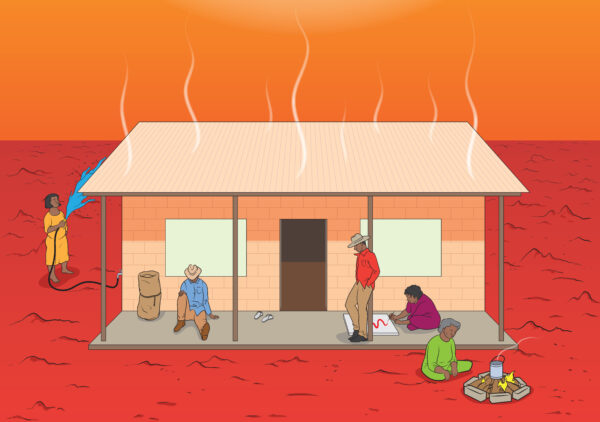
The Northern Territory’s land councils have told the federal government the Environment Protection Biodiversity Conservation Act must ensure big projects are subjected to the most stringent water and climate impact tests.
The land councils demand rigorous assessments be applied to big projects impacting on ground and surface water, not just to fracking and coal mining projects.
They are dismayed that they have not been consulted about the reform of federal environment laws.
“The very survival of our people on country is at stake. We are living the impacts of climate change and water insecurity now, and the forecasts for the North are devastating,” the acting chief executive of the Central Land Council, Dr Josie Douglas, said.
“Our communities are becoming uninhabitable, and the NT’s environment is also under pressure from thirsty development projects.”
“If now is not the time to heed our voices, when the federal government has unprecedented power and political capital, then when?”
“The voice referendum may have been lost but there is no excuse for failing to listen to us on laws that are existential for our survival as Aboriginal peoples.”
“So far, the debate on federal environment laws has been run as a closed shop between the large environment groups and industry. This has to stop. Our representative bodies must be heard now and engaged directly in the design of critical national environmental standards.”
“The Central Land Council called for this in its submissions to the federal environment department under former Environment Minister Tanya Plibersek and in recent correspondence from the Central Land Council and Northern Land Council to Minister Murray Watt,” she said.
Tiwi Land Council chair Leslie Tungatalum said strong national environmental protections are vital to protect environmental and cultural values on the Tiwi Islands – not just for Tiwi people, but for Australia as a whole.
“Our islands are rich and unique in biodiversity. With fewer impacts from legacy land uses compared to the mainland, the islands and surrounding waters are havens for many species and ecological communities that need protection.”
“Strong national environmental standards are vital for the resilience of ecological systems across the islands to protect them.”
Northern Land Council chair Matthew Ryan said: “Aboriginal people have legal rights and interest in 98 per cent of the land in the NT. We must be part of the conversation.”
“Our voices need to be heard for the future of country.”
“Our role is to consult with Aboriginal people across the NT on projects that are going to impact people’s lives and country, yet we have been ignored.”
“We represent the people who live on country. Our people need to prosper on our lands and our seas. We are the people who will be impacted directly by the proposed reforms to the EPBC Act.”
“We call upon Minister Watt to ensure that land councils are part of the conversation going forward, and we welcome his indication that he is willing to consider amendments.”
The land councils ask the minister to:
- Expand the water trigger to all projects that have a significant impact on ground and surface water.
- Ensure projects with major impacts on climate are subject to stringent climate risk assessments and decisions.
- Retain decision-making powers over federal environmental laws
- Consult with NT land councils on the development of the national environmental standards.
- Extend the consultation period for establishing ‘development regions’ from the proposed 30 to 90 days to ensure land councils can facilitate free, prior and informed from traditional owners.
- Ensure that Aboriginal cultural values are part of regional development planning and project assessment. This requires land councils to consult with the relevant traditional owners at all stages.
